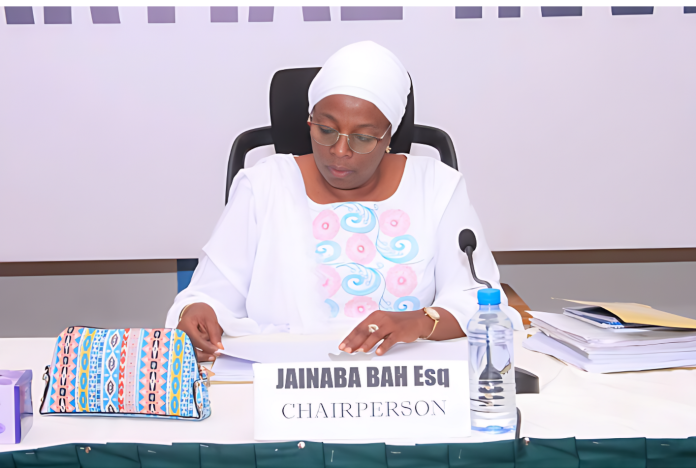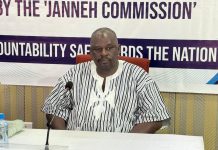By Yankuba Jallow
In a public hearing before the Local Government Commission of Inquiry on Tuesday, 15th July 2025, former senior officials at the Banjul City Council painted a troubling picture of how Mayor Rohey Malick Lowe allegedly ran the council like a personal empire—controlling procurement, influencing financial decisions, and sidelining key officials in ways that undermined accountability and violated established procedures.
Both witnesses dismissed Mayor Lowe’s claims that the mayor of BCC is powerless. Camara emphasized to the Commission that most of the payment vouchers have the instructions of the mayor asking the CEO make the payments.
The hearing, led by Commission Counsel Patrick Gomez, featured testimony from Momodou Camara, former Director of Finance (2020–2024), and Mustapha Batchilly, the former Chief Executive Officer (CEO) of BCC.
Camara stated plainly that he found a system where his role as finance director was rendered “ineffective.” At the center of that dysfunction, he claimed, was Mayor Lowe, whom he said made direct financial directives to the CEO without consulting him as the finance director. “The mayor always directs the former CEO to approve the payments,” Camara said, emphasizing that he was regularly bypassed in matters that fell squarely within his official responsibility.
Camara went on to describe a governance breakdown where the mayor, instead of routing financial requests through the CEO and then to the finance director—as required—would instruct the CEO to make payments directly. “Under normal circumstances, the mayor should forward the requests to the CEO, who should then minute it to the director of finance for advice on availability of funds and whether it is part of the budget,” Camara explained. “But at BCC, the mayor would direct the CEO to pay the funds.”
When Gomez pointed out that Camara had been signing cheques and that doing so suggested consultation, Camara did not respond directly. Gomez reminded the witness that every cheque should come with supporting documents, further pressing him on his role. Camara reiterated that he was kept out of the loop and constantly undercut.
“I found a system that made me ineffective and made me not to work,” Camara said. “Going to work is like going to a war zone.”
He added that his predecessor, who had acted in the position for nearly two years, had applied for the same job and, after losing the appointment, allegedly formed a clique that made Camara’s work difficult. “They will say I am against them,” he said, recalling long meetings from morning until afternoon and emotional trauma. “I was psychologically traumatized and physically drained,” he told the Commission.
When it came to procurement, Camara said that in every ten contracts awarded by the BCC, nine were decided by the mayor. Batchilly, when asked, concurred: “Yes, I will agree with that. I will say 7 out of 10 contracts are decided by the mayor.”
One of the central examples raised during the hearing involved Demba’s Trading, a company awarded multiple contracts by the BCC. Batchilly admitted that the company’s proprietor was a signatory to the Rohey Malick Lowe Foundation and that contracts were awarded “because of the mayor.” “We gave him the contracts because of the mayor. I have had several conversations with the mayor,” he testified. “She always tells me to consider Demba’s Trading.”
Both Camara and Batchilly described the dealings with Demba’s Trading as “corrupt practices.”
“The mayor monopolized the BCC and took over the jobs of procurement, the CEO, and the director of finance,” Camara said. “She was directing and at some points was indirectly doing our jobs and influencing our decisions.” Batchilly responded, “To a large extent, yes.”
The former CEO also spoke of how efforts to challenge or question the mayor often met resistance from the Ministry of Lands. “Whenever we have disagreements and controversies in the BCC, the matters go to the ministry and the ministry used to side with the mayor,” Batchilly said. “I am on oath. The Ministry used to side with the mayor,” he added, contradicting the mayor’s own prior testimony that she was powerless and the ministry ignored her concerns.
Camara testified that internal auditors were targeted for transfers after flagging issues in reports. He also referenced multimillion-dalasi projects—including public toilets at the abattoir and the market—that were executed without following due process. Batchilly admitted that those transactions were unlawful, though he disputed the figures mentioned.
Gomez asked Batchilly whether the council had treated any audit report from 2018 to 2023. While Batchilly did not provide a direct answer, Camara presented documents he had submitted to the BCC documenting audit recommendations and findings. These were admitted into evidence. Batchilly admitted to receiving them but claimed that the violations occurred under Camara’s tenure. He, however, conceded that the problems dated back to 2018.
On the subject of imprest—a system of advance funds disbursed for official use—Batchilly admitted that he authorized funds without ensuring follow-ups. Gomez reminded him that the CEO is responsible for issuing imprest and ensuring that a ledger is maintained. “Auditors have been highlighting that the imprests were not retired and recommended for investigation,” Gomez said. Batchilly acknowledged the lapse, admitting he did not respond to audit reports or follow up on outstanding imprests.
Camara, for his part, said financial statements at BCC could not be prepared because there were no bank reconciliations. He testified that the acting finance manager, Ebou Drammeh, absconded to the United States six months after his arrival, and no one was appointed to replace him. Gomez pressed him, pointing to the financial manual which says the finance director is responsible for bank reconciliations. Camara accepted this, stating: “It was my decision—the issue of bank reconciliation.”
Camara also revealed that Fatou Mbenga frequently requested imprest to execute services on behalf of the mayor.
“We should live within our means,” Camara said, adding that it should have been his responsibility to approach the CEO for a request, which should then be taken to the General Council for approval before any overdraft could be initiated.
“It is the mayor who goes to the banks and negotiate the overdrafts,” he said. He testified that upon his arrival at the council, he was able to clear outstanding debts. After, he said the BCC did not ensure fiscal discipline. The BCC soon returned to taking overdrafts without following due process.



















